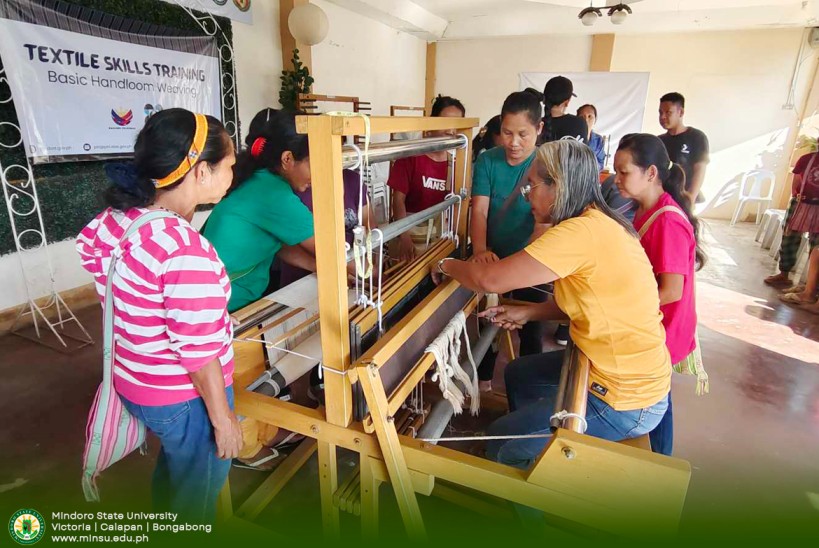
Thirty (30) Hanunuo Mangyan weavers participated for a five-day Textile Skills Training conducted by the Mindoro State University (MinSU) - Awati TI-KAPE Community Development Program in collaboration with the DOST-Philippine Textile Research Institute (PTRI), and the Mansalay Local Government Unit (LGU) held at GP’s Mansalay Food House and Lodging, Mansalay, Oriental Mindoro, August 20 – 24, 2024.
Said training aimed to revitalize the traditional Ramit weaving and empower local weavers with modern techniques and improve their livelihood opportunities while preserving their rich cultural heritage.
The Ramit, a handwoven fabric textile known for its intricate designs and cultural significance, is a hallmark of the Hanunuo Mangyan Community. However, despite its potential in local and global markets, weavers face challenges such as limited production capacity, lack of sustainable materials, and minimal market access. Thus, this training sought to address these issues by equipping participants with advanced weaving skills and linking them to potential resources and markets.
During the opening program, DOST Provincial Director Jesse Pine stressed the importance of preserving the traditional weaving arts and how such training programs can uplift local communities. Likewise, Mayor Ferdinand Maliwanag of LGU-Mansalay expressed his heartfelt gratitude for the program, highlighting its potential to improve the lives of local weavers. Ms. Zussette C. Aplaon, Associate Professor and Awati TI-KAPE Community Development Program leader, also gave an inspiring message, encouraging the participants to take full advantage of the skills they would acquire.
Over the five day-training, the participants underwent various training sessions and hands-on activities, starting with the basics of handloom weaving. Mr. Ronelo P. Vallente, resource speaker from DOST-PTRI, introduced the weavers to the use of upright looms, guiding them through the processes of warping and beaming. He also demonstrated how these modern techniques could be applied to increase productivity and efficiency in their weaving. On its third day, Mr. Samilo O. Garcia, Assistant Trainer from DOST-PTRI led the participants through advanced techniques, including the drawing-in and tying-in processes, as well as loom weaving, which were essential for creating intricate designs.
In addition to the practical skills training, several site visits and assessments were conducted. A team composed of DOST-PTRI, MinSU Awati TI-KAPE, and Mansalay LGU representatives visited the Anabu Weaving Center in Barangay Waygan to assess the condition of local looms and explore ways to improve their use. Another team visited the Mangyan Heritage Center to examine various traditional woven designs and meet with local stakeholders. They also conducted an ocular inspection at MinSU Bongabong Campus to assess the feasibility of establishing a Natural Textile Fibers Innovation Hub, which would support sustainable raw material production and enhance the weaving capabilities of the community.
On the final day, the participants showcased their woven pieces during the graduation ceremony. In addition, Awati TI-KAPE Weavers Association was formed, with its officers elected, to help unify the Mangyan weavers and strengthen their community’s access to resources and markets.
As the training concluded, many of the participants expressed their excitement about using the new techniques to improve their craft. Although some still found it challenging to adapt to the upright looms, they said that they will continue practicing and refining their skills.
MinSU, alongside its partner agencies, is optimistic that the knowledge, skills and techniques gained during the training, combined with ongoing support, will enable the Hanunuo weavers to preserve their traditional craft while exploring new opportunities for sustainable livelihoods. The training not only enhanced their technical abilities but also reinforced the cultural importance of Ramit weaving, ensuring that it continues to thrive for generations to come.
#SDG1 #SDG8 #SDG10 #SDG11 #SDG17
302 Staff
10531 Students
9 Colleges
4 Years